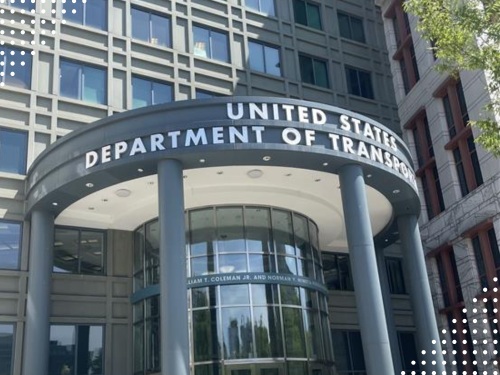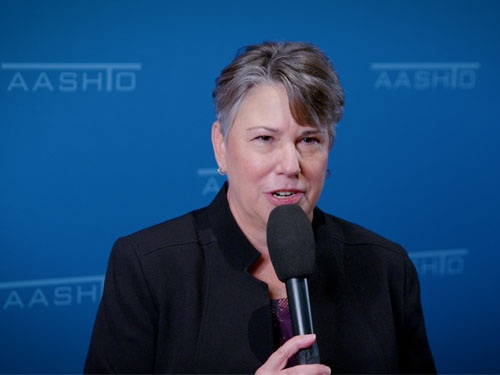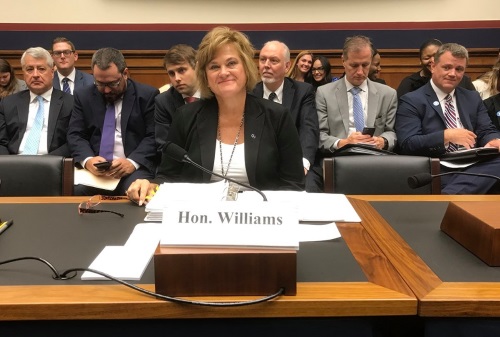Accusations of deliberate transit project grant funding delays on the part of the Trump administration comprised the central focal point of a July 16 House Representatives Transportation and Infrastructure subcommittee hearing – with concerns about the near-term solvency of the Highway Trust Fund thrown in for good measure.
Rep. Peter DeFazio, D-Ore. – chairman of the House T&I committee – accused K. Jane Williams (pictured above), acting administrator of the Federal Transit Administration, of “trying to paint the picture” that “everything is fine” with the agency’s Capital Investment Grant or CIG program.

Instead, he said in his remarks that “the number of days needed for project approval more than doubled under this administration” with “these delays affecting projects regardless of their size, indicating that the delays had nothing to do with the complexity of projects.”
Rep. DeFazio furthermore claimed that analysis conducted by House T&I staff indicated that such delays and other FTA actions since 2017 resulted in at least $845 million in extra costs for transit agencies.
“FTA’s changes to the Risk Assessment process added $650 million to total project costs, and FTA’s delays inflicted on the approval process caused $195 million in additional project costs,” Rep. DeFazio noted. “These additional costs were generally covered by local governments, forcing them to scramble to pay for federal inaction. These unnecessary costs could have instead funded several more transit projects.”

FTA’s Williams countered in her testimony that the accusations that FTA “slowed” signed construction grant agreements “is not true,” adding that the her agency advanced more CIG projects during the first two years of the Trump administration – some 13 project agreements worth $3.3 billion in funding – compared to the 10 project agreements worth $1.08 billion over the same time period during the Obama administration – “an apt comparison given that every new Administration faces a transition period.”
“We are continuing to process projects through the CIG program in accordance with the law and Congressional intent,” she said. “Overall, since this administration began through the end of June, FTA has executed 15 CIG grant agreements … totaling approximately $3.5 billion dollars in transit infrastructure investment. That investment has continued this year, and FTA now has committed approximately $7.6 billion toward 25 new projects.”

Paul Skoutelas, president and CEO of the American Public Transportation Association, noted in his testimony that over the past two decades “both Congress and FTA have repeatedly layered additional requirements on the CIG program, resulting in a bureaucratic maze.”
For example, he said a CIG project sponsor faces analyzing and complying with almost 60,000 words of federal statutory law, regulations, and administrative guidance, while a federal-aid Infrastructure for Rebuilding America or INFRA discretionary grant applicant faces less than one quarter of the statutory language of the CIG program and no specific regulations.
“The bureaucratic maze is not only a burden on CIG project sponsors,” Skoutelas explained. “It also affects local decision-making as communities weigh whether to proceed with a CIG transit project, together with the accompanying program requirements and multi-year process, or, alternatively, build a highway project with limited federal requirements and an expedited USDOT discretionary grant review process.”
Another funding concern expressed at the hearing centered on the impending insolvency of the Highway Trust Fund by 2021, which would result in a corresponding loss of monies destined for transit programs.

“Congress’s chronic failure to fix the Highway Trust Fund program threatens all federal surface transportation programs, including transit projects,” explained Bob Alger, chairman of the American Road & Transportation Builders Association in his testimony.
“The next HTF crisis looms shortly after the 2015 Fixing America’s Surface Transportation Act expires in October 2020,” he said. “While the CIG program is traditionally supported with general revenue dollars through the annual appropriations process, continued uncertainty or disruption to HTF program funding will adversely impact all federal surface transportation programs, including CIG.”
As an example, Alger noted that during the lead up to the FAST Act, such uncertainty about future federal investment and HTF solvency caused seven states in 2015 to delay roughly $1.6 billion in planned transportation projects.
That echoes points Carlos Braceras, executive director of the Utah Department of Transportation and 2018-2019 president for the American Association of State Highway and Transportation Officials, emphasized during a Senate Environment and Public Works committee hearing on July 10.

“The lack of stable, predictable funding from the Highway Trust Fund makes it nearly impossible for state DOTs to plan for large projects that need a reliable flow of funding over multiple years,” he explained in his testimony. “These projects are what connect people, enhance quality of life, and stimulate economic growth in each community where they are built.”
ARTBA’s Alger added that FTA data indicates federal investment accounts for an average of 40 percent of all transit agency capital outlays, which includes spending on guideways, stations, maintenance facilities, passenger vehicles and other fare collection and communication equipment and systems.
Thus there would be serious fiscal ramifications to the nation’s transit systems from a decline if not elimination of HTF funds, he said.
“America’s transportation infrastructure, including its public transportation and roadway system, is in dire need of repair,” Alger noted. “It is clear that we must invest more capital in our transportation systems and that goal cannot be achieved without a permanent revenue solution to ensure the HTF can support this needed investment growth.”
 Top Stories
Top Stories
USDOT Makes $1.5B Worth of BUILD Grants Available
December 19, 2025 Top Stories
Top Stories

